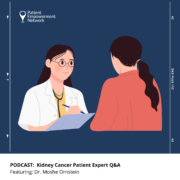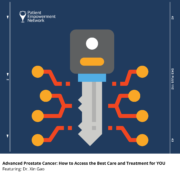The Risks and Benefits of Participating in an MPN Clinical Trial
The Risks and Benefits of Participating in an MPN Clinical Trial from Patient Empowerment Network on Vimeo.
What are the risks and benefits of MPN clinical trial participation? Dr. Angela Fleischman discusses clinical trial risks, benefits, safety protocols, monitoring, and importance of clinical trial participation.
Dr. Angela Fleischman is a physician scientist and assistant professor in the Department of Medicine at the University of California, Irvine. Learn more about Dr. Fleischman.
See More From MPN Clinical Trials 201
Related Programs:

|

Health Equity: Accessing Quality MPN Care and Clinical Trials |

|
Transcript:
Katherine:
When should a patient consider participating in a clinical trial?
Dr. Fleischman:
Okay, well, I guess a patient could really consider participating in a clinical trial at any point if they had a very altruistic philosophy, that understanding that their participation may not necessarily help them at this moment in time, but may help others in the future, and we’ll gain knowledge about myeloproliferative neoplasms.
That’s one approach. Another approach, which is probably a more usual approach, is when a patient has already tried standard therapies and they haven’t quite worked for them, or they’re in a class where, maybe, we don’t have really great standard therapies for somebody.
For example, a myelofibrosis who may not be doing too well and may not necessarily be a candidate for a transplant, I think that’s a very reasonable population to go out and seek clinical trials, because there’s really not necessarily a great standard of care treatments for that patient population, or ET or PV patients who have tried standard of care and, maybe, can’t tolerate standard medications, or they’re just not working for them.
But really, anytime somebody can do a clinical trial, if that’s what they feel is important to them.
What are the benefits and risks of a trial participation?
Dr. Fleischman:
So, the benefits are that you’re getting a drug that, potentially, is better than standard of care, that could be standard of care five to 10 years from now, but you’re getting it early.
As investigators, ethically, we can’t start a clinical trial if we believe that the drug that we’re testing might have negative side effects on the patient, or maybe worse than standard of care. I mean, ethically, that’s not appropriate. So, ethically, we believe that what we’re testing may be better than what we’re currently giving patients, but we don’t know that. So, that’s the purpose of a clinical trial.
So, a clinical trial, it’s a new drug. So, could have side effects that are unanticipated, including death. I mean, that’s just the reality. That would be a very uncommon scenario, but it’s an unknown, so it’s an unknown.
Other things that I think are very important to discuss are the financial implications of a clinical trial. On the pros, one could be getting a free drug that is outside of standard of care, and many of the tests that are done for the purposes of the research are covered. However, drugs, say, if it’s a combination drug, standard of care plus a new drug, the standard of care drug is usually billed to insurance. And so, the patient would need to pay for that, or if there are studies that would be considered standard of care, the patient would need to cover them.
So, I think it, really, is important to discuss the financial implications. What money is it going to save you by participating, and may there be extra costs, or hidden costs, potentially, involved by participating?
Katherine:
Yeah. Let’s talk about safety in clinical trials. Would you review the safety protocols that are in place before a clinical trial even begins?
Dr. Fleischman:
So, before a clinical trial begins, there, usually, needs to be safety information in animals. Also, a lot of drugs have been tried in other diseases first. Either, they’re, have been studied in clinical trials and maybe not found to be very efficacious, but at least we have the value of the safety data in another population.
So, we’re entering, again, into clinical trials with the understanding that it would not be harmful to humans with the data that we have available in animals, or in liquid culture. But again, we just don’t know that. And then, also, for many clinical trials, starting off at lower doses, and then, increasing the dose slowly in different cohorts of patients, to see what’s the maximally tolerated dose.
As well as, when somebody is on a clinical trial, safety and side effects are very closely monitored, and even small side effects that likely have nothing to do with the drug, really do need to be investigated fully, just to make sure that they’re not related to the drug.
Katherine:
Yeah. How do you know if the medicine is safe prior to starting a human trial?
Dr. Fleischman:
That’s a great question.
Based on what the molecule looks like, as well as, many times, they’ve been tested in animals to see – for example, for myeloproliferative neoplasm, it would be important to know, does it change a healthy rat’s blood count? Does it harm their liver? Those sorts of things, and safety information is usually available for a new drug.
Katherine:
Are patients monitored more closely when they’re in a trial?
Dr. Fleischman:
Yes, definitely. And for the purposes, mainly, of paying very close attention to even small side effects that, if somebody was not watched closely, may be missed because they’re so subtle.
Katherine:
But what if they don’t? Why is it crucial that patients participate in trials?
Dr. Fleischman:
Because without participation in clinical trials, we are not going to further our understanding of myeloproliferative neoplasm. Many of the drugs that we use today in myeloproliferative neoplasms, as well as other diseases, the reason why we use them today is because people 10, 20 years ago participated in the clinical trial and demonstrated a benefit of these medications. So, people don’t participate, we’re not going to have new drugs for myeloproliferative neoplasms.










